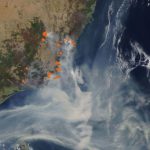 March 3, 2021 3:45 pm
Published by Climate Extremes
March 3, 2021 3:45 pm
Published by Climate Extremes
The largest rivers on Earth are not on the ground, but in the sky. Our new study, published in Environmental Research Letters, showed that nine out of ten of the most expensive floods in New Zealand (2007-2017) occurred during an Atmospheric River event, and seven to all ten of the top ten most extreme rainfall events at eleven different locations occurred during Atmospheric Rivers.
 March 1, 2021 11:57 am
Published by Climate Extremes
March 1, 2021 11:57 am
Published by Climate Extremes
Mi nombre es Denisse Fierro Arcos, soy bióloga marina nacida en Ecuador, pero que adopté a Australia como mi segundo país hace unos años. He trabajado como consultora ambiental e investigadora y he tenido la oportunidad de trabajar en proyectos que se enfocan en una variedad de sistemas y especies marinas en Sudamérica y Australia.
 March 1, 2021 11:53 am
Published by Climate Extremes
March 1, 2021 11:53 am
Published by Climate Extremes
Denisse Fierro Arcos is back in Australia completing her first semester as a PhD student at the University of Tasmania’s Institute for Marine and Antarctic Studies (IMAS). Her project focuses on understanding how fine scale changes in sea ice and ocean conditions affect Southern Ocean marine ecosystems. This is her first blog post.
 February 26, 2021 11:50 am
Published by Climate Extremes
February 26, 2021 11:50 am
Published by Climate Extremes
This time last year Kim Reid was planning a Euro-adventure where she would attend a summer school in the Swiss Alps, attend EGU, visit Reading and the Met Office and explore some castles on the side. Now she and her supervisor joke that if case numbers stay low, Kim might be able to visit a university in the same city.
 February 15, 2021 1:22 pm
Published by Climate Extremes
February 15, 2021 1:22 pm
Published by Climate Extremes
There is a great deal of misuse of climate model projections emerging in business. Climate models are being used for some purposes that are simply inappropriate leading to assessments of the physical risks to business that are of no value. However, there are ways to use climate model data that has value and can help business robustly assess some specific climate related risks.
 February 12, 2021 2:05 pm
Published by Climate Extremes
February 12, 2021 2:05 pm
Published by Climate Extremes
In this study, the researchers propose a reporting format for leaf-level gas exchange data and metadata to provide guidance to data contributors on how to store data in repositories to maximise their discoverability, facilitate their efficient reuse, and add value to individual datasets.
 February 12, 2021 11:35 am
Published by Climate Extremes
February 12, 2021 11:35 am
Published by Climate Extremes
CLEX researchers and colleagues quantified the air quality impact of the Black Summer bushfires of 2019/20 and COVID-19 in the south-eastern states of Victoria and New South Wales (NSW) using a meteorological normalisation approach.
 February 12, 2021 10:01 am
Published by Climate Extremes
February 12, 2021 10:01 am
Published by Climate Extremes
The majority of heatwaves affecting south-eastern Australia are part of large and strong weather systems propagating across Australia, and not due to stationary or blocked weather systems as seen in some other regions of the world.
 February 11, 2021 10:14 am
Published by Climate Extremes
February 11, 2021 10:14 am
Published by Climate Extremes
Storms cause ripples in the wind that travel upwards and away from the clouds, much like a stone causes ripples when it is thrown in a pond. These can then affect the temperature and winds around the storms and make them grow, last longer, or die earlier.
 February 10, 2021 2:18 pm
Published by Climate Extremes
February 10, 2021 2:18 pm
Published by Climate Extremes
The researchers analysed the performance of the ACCESSS1 seasonal forecast model to predict the SPCZ position and rainfall over the period 1990-2012. ACCESSS1 performed better in simulating the SPCZ than the previous model, POAMA.









